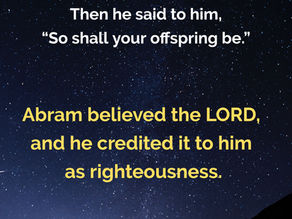Jeremiah 18:1-10 - God's Sovereignty / Our Responsibility
- Chad Werkhoven
- Apr 23, 2025
- 6 min read
God has foreordained all that comes to pass, yet you're fully responsible for your choices.
Jeremiah 18:1-10 (NIV)
18 This is the word that came to Jeremiah from the LORD: 2 “Go down to the potter’s house, and there I will give you my message.” 3 So I went down to the potter’s house, and I saw him working at the wheel. 4 But the pot he was shaping from the clay was marred in his hands; so the potter formed it into another pot, shaping it as seemed best to him.
5 Then the word of the LORD came to me. 6 He said, “Can I not do with you, Israel, as this potter does?” declares the LORD. “Like clay in the hand of the potter, so are you in my hand, Israel. 7 If at any time I announce that a nation or kingdom is to be uprooted, torn down and destroyed, 8 and if that nation I warned repents of its evil, then I will relent and not inflict on it the disaster I had planned. 9 And if at another time I announce that a nation or kingdom is to be built up and planted, 10 and if it does evil in my sight and does not obey me, then I will reconsider the good I had intended to do for it.
Canons of Dordt
Point 1 - God's Unconditional Election
Articles 1-14
Article 1: God’s Right to Condemn All People
Romans 5:12-14 - Mis-Markmanship
Deuteronomy 28:15-20 - Not A Tame Lion
Luke 15:11-16 - Prodigious Deprivation
Psalm 143 - Aggressive Prayer Pattern
Article 2: The Manifestation of God’s Love
Zephaniah 3:14-17 - The Mighty Warrior Who Saves
Lamentations 3:19-23 - Great Is Thy Faithfulness
Article 3: The Preaching of the Gospel
1 Timothy 2:1-7 - God Our Savior
Rom 10:14-17 - The Power of Preaching
1 Cor 1.23-24 - God's Foolishness
Psalm 93 - Mightier Than Chaos
Article 4: A Twofold Response to the Gospel
John 6:37-40 - Tensegral Theology
John 12:42-50 - Buffet Theology
Article 5: The Sources of Unbelief and of Faith
James 1:13-18 - The Devil (didn't) Make You Do It
Ecclesiastes 7:25-29 - Many Schemes
Ephesians 2:8 - The Gift of God
Psalm 95 - The LORD is OUR God
Article 6: God’s Eternal Decree
Ezekiel 36:24-27 - A Whole New Reality
Romans 9:15-21 - God's Mercy, Not Your Effort
2 Thessalonians 2:10-12 - Love The Truth
Article 7: Election
Ephesians 1:3-6 - Before the Foundation
Deuteronomy 7:1-10 - Set Apart
John 17:1-5 - Sovereign Submission
Psalm 115 - God Does What He Pleases
Article 8: A Single Decree of Election
Romans 4:1-8 - One and the Same
Romans 4:9-17 - Chicken or Egg?
Romans 4:18-25 - Faithfully Face the Facts
Hebrews 11:39-40 - Promises Kept
Psalm 33 - God's Control, Authority & Presence
Article 9: Election Not Based on Foreseen Faith
2 Timothy 1:7-10 - Passive & Powered
Deuteronomy 9:4-6 - You're Not That Awesome
Psalm 91 - The Shelter of the Most High
Article 10: Election Based on God’s Good Pleasure
Luke 2:13-14 - Christmas in March
Galatians 4:1-7 - From Slave to Son
1 Peter 2:9-10 - You're The Best Thing God Has!
Article 11: God’s election is unalterable.
Malachi 3:6-7 - Keep It Simple
Hebrews 6:13-20 - Unchanging Anchor
Hebrews 13:1-8 - Keep On Loving
Hebrews 6:13-20 - Unchangeable Blessing
Article 12: The Assurance of election
Hebrews 11:1-6 - Confident Assurance
Malachi 3:14-18 - Childlike Fear
2 Corinthians 7:8-11 - Godly Sorrow
Psalm 65 - The Hearer of Prayers
Article 13/14: The Fruit of our assurance
Isaiah 57:14-21 - God's Second Residence
2 Peter 1:3-10 - Make Every Effort
Isaiah 42:1-9 - The Sovereign & His Servant
Article 18: The Proper Attitude Toward Election and Reprobation
To those who complain
about this grace of an undeserved election
and about the severity of a just reprobation,
we reply with the words of the apostle,
“Who are you, O man, to talk back to God?” (Rom. 9:20),
and with the words of our Savior, “Have I no right to do what I want with my own?” (Matt. 20:15).
Summary
Once again the Bible utilizes the metaphor of a potter turning clay to describe God's sovereignty over creation, but this one is a bit different than the others. This description doesn't feature the purposefully ridiculous premise of a pot talking back, complaining about the form it's being given. This time, though, the clay got marred in the potter's hands, so the potter would rework the clay into another kind of pot as he saw fit (NET).
The LORD was giving Jeremiah more than just a lesson in pottery here. God explains to him that Israel is like clay in the hands of the potter. What God says next is quite remarkable: just as pottery is a dynamic process in that the clay's reaction to the potter's forming influences its final shape, so it is with the people God is shaping.
When the LORD announces destruction but the people repent, as did the Ninevites in Jonah's day, then He relents and does not inflict on it the disaster He had planned. Conversely, when God announces blessings, yet the people rebel and disobey, then He will reconsider the good He had intended to do for it.
So although the potter certainly retains full control over the forming process, the pot retains some say in the matter as well.
Dig Deeper
A fatalist is someone who believes that everything in life is predetermined and unchangeable, so no matter what choices we make, the outcome is already set. Often people conclude that those who embrace these doctrines of grace (Calvinism / TULIP) that we've been studying this year must be fatalists, since we believe that God's eternal, unchanging will is being sovereignly worked out to its end. The future has been foreordained, so whatever was planned to happen will happen regardless of our actions.
But we're not fatalists. Yes, the Bible teaches that God, from all eternity, did, by the most wise and holy counsel of his own will, freely, and unchangeably ordain whatsoever comes to pass (Westminster Confession, Chapter 3). Yet God works out His will in a way that preserves people's responsibility.
To help explain this, theologians make a distinction in how we describe God's will. God's decretive will is that which God has decreed from before creation, all of which will work out exactly as God intends. These decrees include things like who He has elected to salvation and the exact moment that Christ will return to judge the living and the dead.
God's preceptive will are the things He has commanded (precepts), but yet which He allows us to either follow or disobey. These choices we make have consequences that are either good or bad. Passages like today's help explain that God allows history to work itself out in ways that are contingent upon our choices, yet which ultimately conform to His foreordained decrees.
If that sounds confusing, don't worry... it is. But to remain Biblically faithful, you must hold the tension between these two ideas: God sovereignly works out all things according to His eternal plan, but the choices you make and the way you respond to Him matters significantly.
ACKNOWLEDGE WHO GOD IS: Our Father, who sovereignly controls all that comes to pass;
ALIGN YOUR LIFE WITH GOD'S WILL: Pray that you will obey all that God has commanded;
ASK GOD FOR WHAT YOU NEED:
Read the New Testament in a year! Today: Matthew 13




















Comments